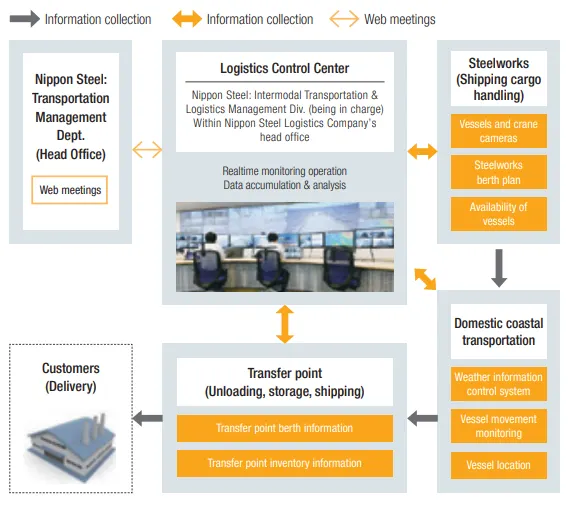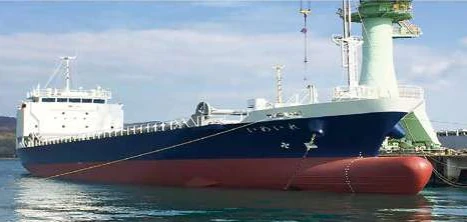Production and Supply Chain Management
To realize the production and supply of steel products required for a sustainable society, Nippon Steel is making various initiatives and DX (digital transformation) for stable procurement, stable production, and shipping in all aspects of the supply chain, from the procurement of raw materials, fuel, equipment, and materials to the shipment to customers.
Initiatives and Achievements
Sustainable procurement efforts
The economic development of emerging countries is a major element of change in the global purchasing environment, requiring Nippon Steel to make strategic purchasing to enhance manufacturing capabilities. At the same time, it is becoming increasingly important for not merely our Company but also our entire supply chain to fulfill social responsibilities in order to realize a sustainable society. Against this background, we steadily and continuously procure raw materials, other materials, and equipment to achieve a stable supply of steel products for a sustainable society.
In terms of procurement of raw materials and fuels, we are sourcing from suppliers worldwide, including Australia, North America, South America, and South Africa, for a stable supply of more than 100 million tons of raw materials for the steelworks. The supply of materials is mainly iron ore and coal. In the procurement of equipment and materials, we purchase around one million product items of equipment and materials — from gigantic facilities such as blast furnaces to electric and mechanical products as well as safety, emergency, and office supplies — from about 3,000 suppliers.
In engaging in these procurement activities, we are committed to compliance with laws and regulations, consideration of environmental conservation, elimination of racial discrimination and human rights abuses, confidentiality, and thorough information management as prerequisites. We then strive to maintain and improve mutual understanding and trust with suppliers from a long-term perspective. In July 2020, upon affirming agreement with efforts made by the Ministry of Economy, Trade and Industry, we made a declaration for the establishment of partnership relations with suppliers and other business partners to establish cooperative and co-existing relationships.
In addition, based on the Nippon Steel Group Human Rights Policy adopted on April 1, 2024, we continue to conduct procurement activities with high ethical standards while giving maximum consideration to respect for human rights.
With regard to equipment and materials for which we have business relationships with many suppliers, we conduct a “Partners Questionnaire” every year to deepen mutual understanding and aim for sustainable development together with our suppliers. The information received is used to formulate various measures to strengthen cooperation and collaboration with suppliers.
Basic policy on equipment and materials procurement
- 1Compliance with laws
- 2Equal opportunities
- 3Building of a partnership
- 4Fair disclosure of information and quick transaction processing
- 5Consideration to resource protection and environmental preservation
- 6Preservation of confidentiality
Consideration to Reducing Environmental Impact in Procurement Activities
Based on the Life Cycle Assessment concept, Nippon Steel is taking initiatives in reducing environmental impact at various points along the supply chain. In keeping with rising demand for tighter management of chemical substances, we have created management standards for 16 toxic chemical substances, including cadmium, jointly with customers and suppliers. We then established a system to manage substances of concern contained in purchasing materials and products, including packaging materials.
In addition, as stipulated in the Charter of Corporate Behavior by Keidanren, we have set up internal rules, including an appropriate purchasing policy, which puts us on record as fully considering resource protection and environmental preservation. Moreover, we have participated in the Green Purchasing Network (GPN) since 1996, when the network was founded, in order to promote green purchasing activities. Jointly with businesses, governments, academia, local governments, and NGOs, we have taken the initiative in developing a framework to prioritize the purchasing of products and services that represent less environmental load.
Laws, Directives, Standards for Toxic Chemical Substances Management We Comply
- Act on confirmation, etc. of Release Amounts of Specific Chemical Substances in the Environment and Promotion of Improvements to the Management Thereof (the PRTR Act)
- Industrial Safety and Health Act
- GHS Classification and Labeling of Chemicals
- JIS Z 7252, 7253
- Registration Evaluation Authorization and Restriction of Chemicals (REACH) Regulation
- Restriction of the use of certain Hazardous Substances in electrical and electronic equipment (RoHS) Directive
- Persistant Organic Pollutants (PoPs) Regulation
Efforts to stabilize production
We are focusing on stabilizing production, including the operation of blast furnaces and coke ovens, which have a particularly significant impact. Currently, the tapping ratio of the blast furnaces remains at a low level, and we are also focusing on developing operational plans under these circumstances.
In such efforts to stabilize production, we also frequently use solutions using DX. For example, in the case of identifying abnormalities in machinery and equipment and preventing problems, regular inspections by manpower had been performed in the past, but now with the installation of a large number of wireless vibration sensors, it is possible to monitor them 24 hours a day, and thereby quickly identify and respond to abnormalities. Further, by centrally managing the collected data and analyzing it with AI and machine learning, we can now obtain even higher value-added information.
Concerning blast furnaces, because it is difficult to grasp the situation inside the blast furnace, there have been cases where the intuition and experience of skilled operators have been relied on. Nowadays, it is by using technology that measures temperature, pressure, gas distribution, and other conditions in one second with sensors installed inside the blast furnace body and reproduces conditions inside the furnace with three-dimensional images that we strive to stabilize blast furnace operations and improve production efficiency. Through this type of simulation, we are developing automatic control that predicts future operating conditions and optimizes operations.
In order to deliver products that meet customer requirements on time, our head office unit in charge of overall management of sales and operations coordinates the relevant corporate-wide product manufacturing plans every day, while keeping track of sales and production. The process control units in each steelworks receive the plan and manage the progress of each single product while keeping in mind the productivity of each manufacturing base. These units work for optimal processing from manufacturing to shipment, and delivering products as scheduled.
Improve productivity in domestic logistics
Approximately 60% of our domestic steel products are transported by about 200 coastal ships, which provide the primary means of transportation for industrial logistics. In the coastal shipping industry, as in other logistics industries, the shortage of workers has been a problem.
As one of the ways to answer the question of how to improve logistics, the Nippon Steel Group is working on improving logistics efficiency by establishing a logistics control center at its head office and utilizing the latest domestic logistics control system. Specifically, we consolidate the information needed for allocation and control of the coasters, such as their location data, progress rate of quay cargo handling at the steelworks, and the status of inventory at transfer points. We then perform real-time monitoring and operation, thereby improving transportation efficiency.
We believe that these efforts will lead to increased productivity and ease of work in domestic industrial logistics as well as in the domestic shipping industry, and will contribute to alleviating the shortage in the workforce.

Dealing with the workforce shortage in domestic logistics

The Nippon Steel Group has therefore built a practical training ship, Reimei, and started its operation as one of the ways to secure crews. Many operators (shipowners) in the coastal shipping industry are small or medium-sized business persons and find it difficult to recruit and train new sailors even if they are willing because extra cabin space cannot be installed and the crew members find it burdensome to teach newcomers. Reimei is well designed with cabin space for an instructor and up to five trainee students, comfortable living space, a bridge, and a dining room, greatly contributing to the development of new sailors.
We will continue to make efforts for the sustainable development of domestic industrial logistics.